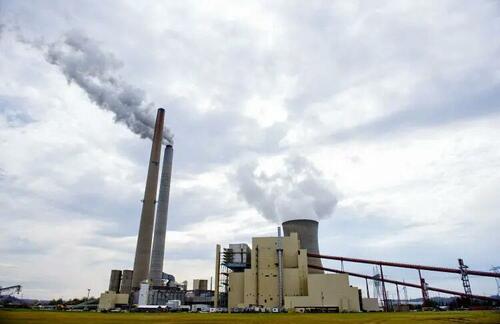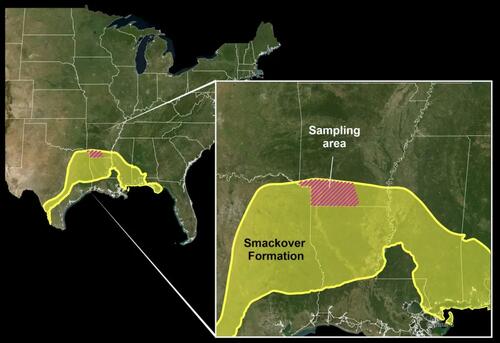
Министр энергетики раскритикован сенатской Группой по поводу финансирования Clawbacks
Автор John Haughey via The Epoch Times (выделено нами),
Министр энергетики Крис Райт оправдал прекращение 24 энергетических проектов, выделенных Конгрессом $3,7 млрд, во время заседания Сената в среду.. Райт сказал, что когтевые когти были первым раундом проверки недавно созданной наблюдательной комиссией, которая исследует 500 авторизованных предприятий, которые должны получить финансирование в размере 300 миллиардов долларов до 2032 года.
 Проект солнечной энергии Crescent Dunes недалеко от Тонопы, штат Невада, в 190 милях к северо-западу от Лас-Вегаса, является примером проектов в области возобновляемых источников энергии, инициированных президентом Джо Байденом. Даниэль Слим / AFP через Getty Images
Проект солнечной энергии Crescent Dunes недалеко от Тонопы, штат Невада, в 190 милях к северо-западу от Лас-Вегаса, является примером проектов в области возобновляемых источников энергии, инициированных президентом Джо Байденом. Даниэль Слим / AFP через Getty Images"Министерство энергетики США проводит тщательный анализ финансовой помощи, которая выявляет пустую трату долларов налогоплательщиков, защищает национальную безопасность Америки и продвигает приверженность президента Трампа развязать американское энергетическое доминирование.Он сказал комитету Сената по энергетике и природным ресурсам в двухчасовом слушании 18 июня по предложенному его департаментом бюджетному запросу на 46,3 миллиарда долларов в 2026 финансовом году.
«Эти проекты не соответствовали стандартам экономической, национальной безопасности или энергетической безопасности, необходимым для поддержания инвестиций Министерства энергетики, и налогоплательщики не должны быть вынуждены субсидировать их», - сказал Райт, отметив, что завершенные проекты были среди «179 наград на сумму 15 миллиардов долларов», рассмотренных со всеми, кроме 24 проходных сборов.
Слушания были первыми перед комиссией Сената с тех пор, как 16 июня финансовый комитет палаты опубликовал свой проект адаптации «большого красивого» бюджетного законопроекта президента Дональда Трампа, принятого 22 мая Палатой представителей.
План Сената в значительной степени повторяет прекращение Палатой представителей налоговых льгот на электромобили, тепловые насосы, энергоэффективные бытовые приборы и солнечную энергию, устраняя или сокращая субсидии на ветер и солнечную энергию, расширенные в соответствии с Законом о сокращении инфляции 2022 года (IRA).
Райт сказал, что среди первых вещей, которые он сделал после своего январского подтверждения, был хорек через проекты, предназначенные для получения авторизованного финансирования IRA через Управление кредитной программы Министерства энергетики США.
«Мы глубоко обеспокоены тем, сколько миллиардов долларов было выброшено за дверь без должной осмотрительности в последние дни администрации Байдена», — сказал он. DOE «вытащила более 100 миллиардов долларов... между днем выборов и инаугурацией [Трампа 20 января]. "
Он привел несколько проектов, которые мало оправдывали федеральное финансирование, в том числе один, который должен был получить 2,5 миллиона долларов, но затем запросил и получил 200 миллионов долларов без оформления документов.
«В ответ на подобные вещи мы создали этот процесс обзора программ, в котором у нас есть команда кросс-функциональных людей для оценки каждого проекта», — сказал Райт.
"Таких проектов 500.- продолжил он. "Мы будем оценивать каждого из них профессионально — не политическим образом, не в корыстных интересах, а в деловой манере."
В меморандуме от 15 мая Райт издал политику «по каждому случаю» и 30 мая объявил о «прекращении» 24 наград, предоставленных Управлением по демонстрациям чистой энергии, в результате чего было выделено 3,7 миллиарда долларов.
Проекты включают финансирование улавливания и секвестрации углерода, а также декарбонизацию «зеленой энергии» с 16 наградами после выборов президента Трампа 5 ноября.
По словам Райта, в настоящее время в стадии разработки находятся более 150 проектов, которые уже начаты. По его словам, ведомство будет пересматривать «не менее 20 раз в неделю».
«Сейчас мы финансируем множество проектов. Когда мы их оценим, пройдет много проектов, - сказал он. В других проектах мы скажем: Эй, вы можете изменить его, чтобы сделать его более полезным? Некоторые из них будут изменены, некоторые будут завершены. "
 Американская электростанция Mountaineer в Нью-Хейвене, штат Вирджиния, в 2009 году стала первой в мире, оснащенной технологией улавливания и секвестрации углерода. Saul Loeb/AFP/Getty Изображения
Американская электростанция Mountaineer в Нью-Хейвене, штат Вирджиния, в 2009 году стала первой в мире, оснащенной технологией улавливания и секвестрации углерода. Saul Loeb/AFP/Getty ИзображенияКонституционные вопросы
Сенаторы Кэтрин Кортес-Масто (D-Nevada), Мартин Генрих (D-N.M.) и Ангус Кинг (I-Maine) поставили под сомнение конституционную законность отмены финансирования, утвержденного в соответствии с законопроектами, принятыми Конгрессом.
"Эти 24 программы уже были приняты. Конгресс их одобрил,- сказал Кортес-Масто. "Итак, какие юридические полномочия вы должны были вернуться и прекратить их?"
«Все контракты, как и в бизнесе, имеют пункты об отмене», — сказал Райт. «Мы ведем диалог со всеми этими сторонами. Некоторые проекты могут быть исправлены, чтобы сделать их более жизнеспособными. "
Генрих сказал во время январских слушаний по утверждению Райта: «Я спросил вас, имеет ли исполнительная власть полномочия, без одобрения Конгресса, удерживать или прекращать финансирование Конгресса, утвержденного законом. Вы сказали, что будете следовать законам и уставам Соединенных Штатов Америки. ?
"Отмена этих призов пересекает территорию конфискации и, безусловно, является нарушением контракта.- добавил он.
Кинг был обеспокоен тем, что «значительное количество программ» подвергается проверке: Можете ли вы заверить меня, что обзор является профессиональным и инженерным, а не политическим? "
«Абсолютно, это аполитично», — сказал Райт. «Мы оцениваем инженерию, науку, финансы и просто жизнеспособность проектов. К сожалению, это не было сделано, когда были предоставлены гранты. "
Сенаторы лоббировали Райта, чтобы переоценить отвергнутые проекты или ускорить другие.
Сенатор Джон Ховен сказал, что операторы природного газа Северной Дакоты рассматривают улавливание и секвестрацию углерода как способ «взломать код» в увеличении производства.
Прямо сейчас, по его словам, фрекеры добывают «менее 10 процентов нефти из сланца Баккен и других сланцевых месторождений» с «горячей водой и другими вещами», которые неэффективны при смывании на поверхность.
«CO2 будет гораздо более эффективным», — сказал Ховен, попросив Райта «сделать это», пересмотрев отвергнутые и ожидающие углеродные проекты.
Рад, что вы сделали это заявление, - сказал Райт, добавив, что секвестрация углерода еще не доказала свою жизнеспособность, чтобы оправдать поддержку налогоплательщиков.
«Для угольной электростанции, например, чтобы провести секвестрацию, в основном вы теряете треть энергии от станции, чтобы впрыснуть CO2 под землю, — сказал он. — Если мы сможем потратить 1 доллар и получить 2 доллара выгоды, мы будем делать это каждый день и по воскресеньям». "
Король давил Райт для ускорения крупномасштабных проектов батарей.
«Один из них, который меня особенно интересует, — это крупнейший проект по производству батарей в Западной Вирджинии, который планируется разместить в небольшом городке в штате Мэн», — сказал он. «Это будет иметь огромное значение» для развития солнечной и ветровой энергии.
«Я также очень заинтересован в этой технологии», — сказал Райт, пообещав, что «мы перейдем к этому проекту». "
 Формирование Smackover на юго-западе Арканзаса, область в красном затененном районе отбора проб в начале, содержит от 5 до 19 миллионов метрических тонн лития, согласно исследованию Геологической службы США и Департамента энергетики и окружающей среды Арканзаса. USGS
Формирование Smackover на юго-западе Арканзаса, область в красном затененном районе отбора проб в начале, содержит от 5 до 19 миллионов метрических тонн лития, согласно исследованию Геологической службы США и Департамента энергетики и окружающей среды Арканзаса. USGSКритические минеральные проекты
Кортес-Масто и сенатор Том Коттон (R-Ark.) попросили Райта обеспечить, чтобы обзоры способствовали критическому развитию полезных ископаемых.
Кортес-Масто сказал, что президент Трамп 23 мая сослался на Закон об оборонном производстве, отказавшись от важнейших полезных ископаемых. «Я поддерживаю это», — сказала она
Тем не менее, когда Министерство энергетики США через неделю отменило 24 проекта, среди них был «один в Неваде, использующий инновационные решения для создания единственного в стране универсального источника глинозема», — сказала она.
Так. Пожалуйста, объясните мне, как вы принимаете это решение, когда вы идентифицируете критические полезные ископаемые, но в то же время вы отнимаете необходимое финансирование для того, чтобы эта страна была независимой, когда дело доходит до этих критических полезных ископаемых.Кортес-Масто спросил.
«Это действительно сводится к дьяволу в деталях», — сказал Райт. Мы рассматриваем каждый проект, который мы проходим, просто чтобы сказать: «Этот проект, в конце концов, приведет к положительному результату?»
Коттон сказал, что Министерство энергетики США в сентябре предоставило Standard Lithium грант в размере 220,5 млн долларов на разработку запасов лития в формации Smackover в Арканзасе, «где Геологическая служба США обнаружила от 15 до 19 млн тонн лития. "
«Спрос на литий значительно увеличился в последние годы, но в настоящее время на Соединенные Штаты приходится только около 1 процента добычи лития и менее 5 процентов передовых мощностей по химической переработке лития во всем мире», - сказал он. "Когда Арканзас может ожидать ответа на вопрос о том, когда будет утвержден грант? "
«Все крупные проекты будут реализованы к концу августа, возможно, гораздо раньше», — сказал Райт. «Мы хотим быть осторожными с деньгами американских налогоплательщиков, с деньгами, которые вы выделили... что эти проекты ответственны, заслуживают доверия и продуманны и приведут к некоторым хорошим результатам. "
Тайлер Дерден
Фри, 06/20/2025 - 05:00















